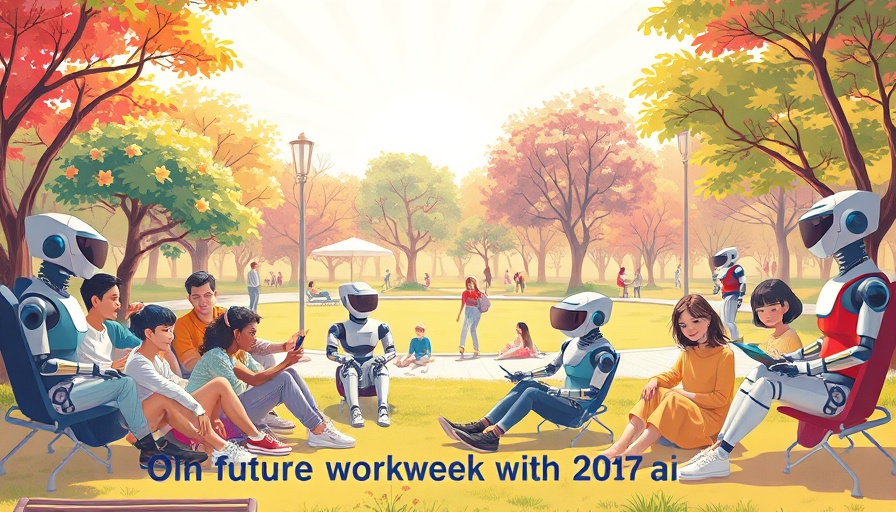
The Push Towards a 4-Day Workweek: A Technological Opportunity
The emergence of artificial intelligence (AI) has sparked vibrant discussions around the future of work, particularly in its potential to redefine traditional working hours. Recently, Senator Bernie Sanders proposed the idea of a 4-day workweek, suggesting that productivity gains afforded by AI should translate into less working time for employees. This suggestion, far from being radical, mirrors trends already in motion within certain organizations worldwide. Companies like Microsoft Japan, for instance, have reported a productivity boost of 40% following their trials of a 4-day workweek approach. Similarly, 61 UK companies saw revenue growth from implementing this structure. This sparks an important conversation around how AI could be leveraged to improve the balance between work and personal life.
In 'Should AI Mean a 4 Day Workweek?', the discussion dives into groundbreaking concepts in labor distribution amid technological advancement, exploring key insights that sparked deeper analysis on our end.
Historical Context: A Shift in Work Culture
The idea of a shorter workweek is not new; it has been around since the early 20th century. Organizations have long acknowledged that employees who have a better work-life balance tend to be more productive and engaged. Historically, labor movements have advocated for reduced work hours, which culminated in the establishment of the standard 40-hour workweek. However, with advancements in technology such as AI, the conversation has shifted. Now, the prospect of less work for greater productivity is possible, yet it remains to be seen how quickly businesses will adapt.
Value of Reducing Work Hours: More Than Just Time Off
Adopting a 4-day workweek could provide numerous benefits, not just for employees but also for businesses. Senator Sanders emphasized that the time saved could be used for family, education, or personal projects—creating a workforce that is fulfilled and thus, potentially more engaged. Increased fulfillment is likely to result in reduced turnover rates and lower recruitment costs, which are vital in today’s competitive labor market.
Counterarguments: Balancing Efficiency with Worker Expectations
However, there are legitimate counterarguments to the mandatory implementation of a shorter work week. Critics argue that productivity might plateau if the workweek is shortened across the board, and those who wish to work more hours might penetrate competitive structures. Moreover, some may fill their free time with side jobs, detracting from the intended aim of a balanced lifestyle. Finding the right balance between hours worked and productivity remains a complex challenge.
The Future of Work: Redefining the Social Contract
As we move towards a potentially hyper-abundant world fueled by AI advancements, we must consider what the 'social contract' for labor will look like. The dominant paradigm of work could shift, transforming definitions of productivity, success, and fulfillment. We need open discussions that address how to distribute the benefits of transformative technologies fairly while ensuring that hard work is still acknowledged.
AI Transformations: Implementing Change in Your Business
For business owners looking to adopt technological changes such as AI and the 4-day workweek, it will be essential to harness tools and resources that facilitate this transition. Embracing AI tools can streamline operations and enhance productivity, providing the framework necessary to implement shorter work weeks effectively. Prioritizing employee satisfaction and leveraging AI might just lead to a more loyal and productive workforce.
Practical Tips: Starting with AI in Your Workplace
For those ready to begin their journey into AI and explore innovative work structures, there are actionable steps to consider:
- Assess your current operations: Identify routine tasks that can be automated through AI.
- Invest in AI solutions: Choose software that aligns with your business model and needs.
- Encourage a culture of experimentation: Allow your team to test AI applications and solicit feedback.
- Evaluate outcomes: Measure productivity and employee well-being regularly to gauge success.
By taking these steps, business owners can lay the groundwork for an AI-integrated future that not only embraces technology but also enhances the overall quality of work and personal life for employees.
As we consider these insights about the potential for a 4-day workweek, it’s vital to act. The conversation around AI and productivity is just beginning, and now is the time to start using AI solutions in your business.
 Add Row
Add Row  Add
Add 




Write A Comment